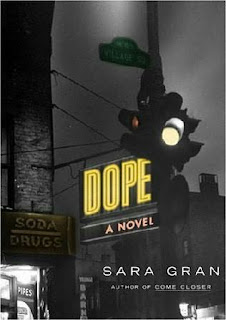Ending Things Badly
Finished reading Dope by Sara Gran last night. It was definitely a page turner, but on the very last page, I wanted to throw the book across the room. The story is set in Manhattan in the 1950s and the female protagonist is a former junkie in her mid-thirties. The story is told in her sardonic and jaded voice, and the plot revolves around her trying to track down a missing girl, a blond Barnard College drop out who has started shooting up and gotten mixed up with a low life drug dealer/pimp. Searching for the woman takes the private eye back to her old haunts and temptations; she meets up with her ex-husband who got her hooked on drugs and he's still using, having shrunken down to a skeletal version of his younger, healthier self. Etc., etc., and I was relieved that the author didn't let the narrator give in and start using again, though she's thinking about it all the time. However...here's where I tell the ending, okay? Just skip forward to the Huffington Post blog is you don't want to know what happens. However, as the story begins to wrap up with all the mysteries solved and the lost girl found, a twist occurs--one we may have seen coming or not, but definitely an ah-ha ending that I think detracted from the whole rest of the story.
First, I don't need all of my endings to be happy ones. And this story wasn't going to end happily. The narrator didn't come into a great amount of money or suddenly get offered a job by the police force or meet the man of her dreams. She was going to keep struggling with her addiction, but she had the slight possibility for redemption because she had found this drugged up drop out, someone not totally unlike herself, a nice parallel. The book could have ended with the two of them together in this cruddy little apartment while the younger girl starts to undergo withdrawal and the narrator gets ready to wait it out. Instead, the narrator's half sister shows up at the last second, reveals that she was the real villain all along, and shoots the narrator in the stomach. The last few paragraphs show us the narrator dying; gradually losing consciousness and returning to memories of the first time she snorted heroin. The end.
I guess maybe that happens in some Raymond Chandler hard boiled stories too, maybe. But killing off your first person narrator is the work of a trickster writer--one who pulls out the rug at the last second and goes, Gotcha! I bet you didn't think she would die, did you? It's the worst kind of implausible ending, the type new student writers pull (along with the story being all a dream or discovering the narrator is not really a person, but a rutabaga). If the rest of your book deals in hard, gritty reality, you're not allowed to change the rules and reveal the narrator is dead all along. I mean, where is she writing this from? Is this whole thing a detailed journal entry where the last words trail off the page as she uses her dying breath to finish up the tale?
I don't like it and I don't recommend it. I checked out another one of her books and lent it to my friend Liz. She says she started it, but found it to be depressing. Maybe we need a break and I should check out Wolf Hall by Hillary Mantel, which is the next book on my list.
First, I don't need all of my endings to be happy ones. And this story wasn't going to end happily. The narrator didn't come into a great amount of money or suddenly get offered a job by the police force or meet the man of her dreams. She was going to keep struggling with her addiction, but she had the slight possibility for redemption because she had found this drugged up drop out, someone not totally unlike herself, a nice parallel. The book could have ended with the two of them together in this cruddy little apartment while the younger girl starts to undergo withdrawal and the narrator gets ready to wait it out. Instead, the narrator's half sister shows up at the last second, reveals that she was the real villain all along, and shoots the narrator in the stomach. The last few paragraphs show us the narrator dying; gradually losing consciousness and returning to memories of the first time she snorted heroin. The end.
I guess maybe that happens in some Raymond Chandler hard boiled stories too, maybe. But killing off your first person narrator is the work of a trickster writer--one who pulls out the rug at the last second and goes, Gotcha! I bet you didn't think she would die, did you? It's the worst kind of implausible ending, the type new student writers pull (along with the story being all a dream or discovering the narrator is not really a person, but a rutabaga). If the rest of your book deals in hard, gritty reality, you're not allowed to change the rules and reveal the narrator is dead all along. I mean, where is she writing this from? Is this whole thing a detailed journal entry where the last words trail off the page as she uses her dying breath to finish up the tale?
I don't like it and I don't recommend it. I checked out another one of her books and lent it to my friend Liz. She says she started it, but found it to be depressing. Maybe we need a break and I should check out Wolf Hall by Hillary Mantel, which is the next book on my list.

Comments